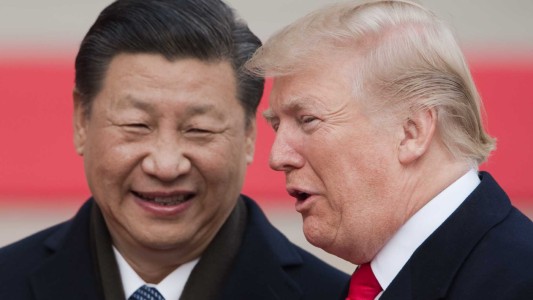
Early Friday morning, China responded to the Trump administration’s tariffs by revealing that they are proposing tariffs on 128 U.S. products that had an import value of $3 billion in 2017.
The proposed tariffs come in response to Trump signing “an executive memorandum on Thursday that would impose retaliatory tariffs on up to $60 billion in Chinese imports,” CNBC reported.
The proposed tariffs from China were released in the early morning hours on Friday as China’s commerce ministry weighed taking action against the U.S. A separate report from CNBC adds:
The U.S. goods, which had an import value of $3 billion in 2017, include wine, fresh fruit, dried fruit and nuts, steel pipes, modified ethanol, and ginseng, the ministry said. Those products could see a 15 percent duty, while a 25 percent tariff could be imposed on U.S. pork and recycled aluminum goods, according to the statement.
The statement did not go into greater detail. U.S. agricultural products, particularly soybeans, have been flagged as the biggest area of potential retaliation by Chinese President Xi Jinping’s administration.
In a memo from the White House on Thursday, Trump revealed that he had directed “the United States Trade Representative to determine whether to investigate China’s laws, policies, practices, or actions that may be unreasonable or discriminatory and that may be harming American intellectual property rights, innovation, or technology development.”
According to the statement, the Trade Representative advised Trump that the investigation supports the following findings:
- First, China uses foreign ownership restrictions, including joint venture requirements, equity limitations, and other investment restrictions, to require or pressure technology transfer from U.S. companies to Chinese entities. China also uses administrative review and licensing procedures to require or pressure technology transfer, which, inter alia, undermines the value of U.S. investments and technology and weakens the global competitiveness of U.S. firms.
- Second, China imposes substantial restrictions on, and intervenes in, U.S. firms’ investments and activities, including through restrictions on technology licensing terms. These restrictions deprive U.S. technology owners of the ability to bargain and set market-based terms for technology transfer. As a result, U.S. companies seeking to license technologies must do so on terms that unfairly favor Chinese recipients.
- Third, China directs and facilitates the systematic investment in, and acquisition of, U.S. companies and assets by Chinese companies to obtain cutting-edge technologies and intellectual property and to generate large-scale technology transfer in industries deemed important by Chinese government industrial plans.
- Fourth, China conducts and supports unauthorized intrusions into, and theft from, the computer networks of U.S. companies. These actions provide the Chinese government with unauthorized access to intellectual property, trade secrets, or confidential business information, including technical data, negotiating positions, and sensitive and proprietary internal business communications, and they also support China’s strategic development goals, including its science and technology advancement, military modernization, and economic development.
Trump continued in the statement, saying that he is taking the following actions as a result:
- Section 1. Tariffs. (a) The Trade Representative should take all appropriate action under section 301 of the Act (19 U.S.C. 2411) to address the acts, policies, and practices of China that are unreasonable or discriminatory and that burden or restrict U.S. commerce. The Trade Representative shall consider whether such action should include increased tariffs on goods from China.
- (b) To advance the purposes of subsection (a) of this section, the Trade Representative shall publish a proposed list of products and any intended tariff increases within 15 days of the date of this memorandum. After a period of notice and comment in accordance with section 304(b) of the Act (19 U.S.C. 2414(b)), and after consultation with appropriate agencies and committees, the Trade Representative shall, as appropriate and consistent with law, publish a final list of products and tariff increases, if any, and implement any such tariffs.
- Sec. 2. WTO Dispute Settlement. (a) The Trade Representative shall, as appropriate and consistent with law, pursue dispute settlement in the World Trade Organization (WTO) to address China’s discriminatory licensing practices. Where appropriate and consistent with law, the Trade Representative should pursue this action in cooperation with other WTO members to address China’s unfair trade practices.
- Sec. 3. Investment Restrictions. (a) The Secretary of the Treasury (Secretary), in consultation with other senior executive branch officials the Secretary deems appropriate, shall propose executive branch action, as appropriate and consistent with law, and using any available statutory authority, to address concerns about investment in the United States directed or facilitated by China in industries or technologies deemed important to the United States.
As a candidate, I pledged that if elected I would use every lawful tool to combat unfair trade, protect American workers, and defend our national security. Today, we took another critical step to fulfill that commitment. https://t.co/7NBI0Dibmx pic.twitter.com/nmzqos3BUA
— Donald J. Trump (@realDonaldTrump) March 22, 2018
Source: The Daily Wire
